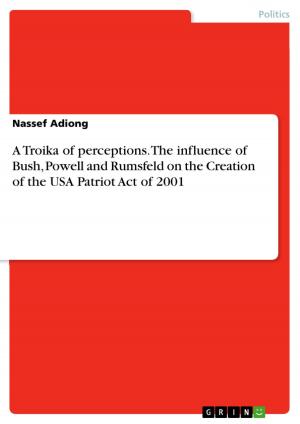Why has the growth in international banking continued despite a reduction in regulatory constraints?
Business & Finance, Finance & Investing, Banks & Banking| Author: | Jonas Schirm | ISBN: | 9783638518482 |
| Publisher: | GRIN Publishing | Publication: | July 7, 2006 |
| Imprint: | GRIN Publishing | Language: | English |
| Author: | Jonas Schirm |
| ISBN: | 9783638518482 |
| Publisher: | GRIN Publishing |
| Publication: | July 7, 2006 |
| Imprint: | GRIN Publishing |
| Language: | English |
Seminar paper from the year 2006 in the subject Business economics - Banking, Stock Exchanges, Insurance, Accounting, grade: A, Anglia Ruskin University, course: International Banking Issues, 19 entries in the bibliography, language: English, abstract: Financial liberalization has caused a jump in volatility and risk in the past. Examples are: the 1994-1995 Mexican peso crisis and the 1997 Asian crisis. Due to international interdependencies the Asian crisis i.e. dragged down the Russian and Brazilian economy. Both crises resulted from inadequately monitored large-scale flows of private, short-term capital (Bank for International Settlements 1998). Furthermore the opening of national capital markets in many countries led into financial sector crisis. Cost of such crisis can reach 3 per cent to 25 per cent of GDP. The United States Savings and Loan crisis cost the world's strongest economy 3 per cent of GDP. Japanese loan crises cost the economy an immeasurable amount of money, the absolute loss in smaller countries can even be bigger. Recent cases include i.e. Venezuela, 18 per cent; Bulgaria, 14 per cent; Mexico, 12-15 per cent; Hungary, 10 per cent. Other cases of even weaker economies like Argentina, Chile and Côte d'Ivoire have experienced costs of over 25 per cent of GDP in their crises (Goldstein, Turner 1996). Another trend was recognizable 20 years ago, due to deregulation the banks noticed increasing competition followed by lower margins. That is why many banks started to bank global. Not only to stay into the increasing competition had they followed their global going customers on foreign markets. Owing to the increasing need to hatch back the rising risks of dealing in foreign currencies, the volume of derivatives trading increased enormously. Many 'rough traders' have seen their way to easy, quick money. One of them was Nick Leeson of Bearings ruining his company on the SIMEX exchange in Singapore. Due to this globalisation of banking, technological change and an increasing range of financial instruments and products the banking sector continued growing.
Seminar paper from the year 2006 in the subject Business economics - Banking, Stock Exchanges, Insurance, Accounting, grade: A, Anglia Ruskin University, course: International Banking Issues, 19 entries in the bibliography, language: English, abstract: Financial liberalization has caused a jump in volatility and risk in the past. Examples are: the 1994-1995 Mexican peso crisis and the 1997 Asian crisis. Due to international interdependencies the Asian crisis i.e. dragged down the Russian and Brazilian economy. Both crises resulted from inadequately monitored large-scale flows of private, short-term capital (Bank for International Settlements 1998). Furthermore the opening of national capital markets in many countries led into financial sector crisis. Cost of such crisis can reach 3 per cent to 25 per cent of GDP. The United States Savings and Loan crisis cost the world's strongest economy 3 per cent of GDP. Japanese loan crises cost the economy an immeasurable amount of money, the absolute loss in smaller countries can even be bigger. Recent cases include i.e. Venezuela, 18 per cent; Bulgaria, 14 per cent; Mexico, 12-15 per cent; Hungary, 10 per cent. Other cases of even weaker economies like Argentina, Chile and Côte d'Ivoire have experienced costs of over 25 per cent of GDP in their crises (Goldstein, Turner 1996). Another trend was recognizable 20 years ago, due to deregulation the banks noticed increasing competition followed by lower margins. That is why many banks started to bank global. Not only to stay into the increasing competition had they followed their global going customers on foreign markets. Owing to the increasing need to hatch back the rising risks of dealing in foreign currencies, the volume of derivatives trading increased enormously. Many 'rough traders' have seen their way to easy, quick money. One of them was Nick Leeson of Bearings ruining his company on the SIMEX exchange in Singapore. Due to this globalisation of banking, technological change and an increasing range of financial instruments and products the banking sector continued growing.















